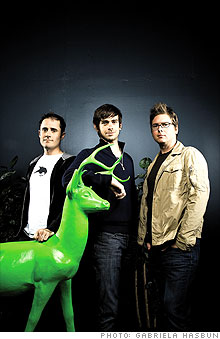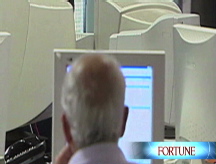The true meaning of Twitter
What exactly is Twitter? And what does its exploding popularity say about the state of the tech industry? Inside the hottest Web startup since ... gosh, February at least.
 |
| Twitter co-founders (from left) Evan Williams, Jack Dorsey, and Biz Stone. They've got major money, deafening buzz, and green statuary. |
(Fortune Magazine) -- I am sitting in a meeting room at the San Francisco offices of Twitter, chatting with the fast-growing startup's 31-year-old CEO, Jack Dorsey, when a wave of déjà vu washes over me. The youthful vibe, the playful decor, the funky South of Market loft space - I've been here before. In 2005, Mark Zuckerberg earnestly explained to me the importance of Facebook as we sat in his similarly appointed office in Palo Alto. Chad Hurley and Steve Chen walked me through YouTube's growth story the following year in their cramped space above a San Mateo, Calif., pizza parlor.
Facebook and YouTube have yet to gush profits - a fact that is the talk of Silicon Valley. Yet here I am again, in July 2008, listening to yet another boyish entrepreneur discuss a quirky, compelling - and nearly revenue-less - startup.
I ask Dorsey, a 31-year-old NYU dropout whose slender build and mop of hair evoke the pre-psychedelic Beatles, when Twitter will start making money, known around these parts as "monetization." "We'll monetize when the time is right," he says, as the backfire of a motorcycle on the street below roars through the room's open windows. "We raised enough money [$22 million] to get to that point through experimentation."
Only in the tech business are companies born with neither a clear reason for being nor a clue as to how they'll produce profits. Then again, rejoice: The U.S. financial system may be imploding as you read this, but the Bay Area startup culture is alive and well. Oodles of Web startups are gaining traction which makes this a good time to examine the star of the class.
Twitter, in case you're over 25 and don't live in a trendy coastal metropolis, is a "micro-blogging" site. It's a free service that lets you send the briefest of messages to everyone in your network. It marries the mass appeal of blogging with the rat-a-tat-tat of text messaging.
To use Twitter, first go to the site and sign up for a handle - mine, for example, is adamlashinsky - and then start typing in the entry field. Maximum message size: 140 characters. Twitter refers to these missives as "updates"; its users prefer the term "tweets." Users "follow" one another and, if they choose, receive a notification when new messages arrive. Twitterers do their thing at Twitter.com as well as by cell phone and on sites like Facebook.
And what do Twitterers twitter about? Anything at all really, from the quotidian ("I'm hungry"; "going to bed"; etc.) to the substantial ("wildfires are spreading"; "Hillary just conceded"). Like a lot of Web 2.0 applications, the best way to understand it is to just try it out.
Thousands of people are doing that every day. According to comScore, Twitter had almost three million monthly users as of June, which is triple what it had last November. Those figures are probably low because they don't measure mobile activity, which is a large part of the Twittersphere.
Whatever the exact usage numbers, the service is right in the zeitgeist. The community was, ahem, atwitter when Jon Stewart mentioned the site on "The Daily Show" in June. In July, a congressman from Texas, John Culberson (R-Texas), had to be told by House leadership to stop Twittering his constituents from the floor of the chamber.
Other establishment types are getting down with Twitter. Barack Obama's campaign (handle: BarackObama) has 51,620 followers and counting, who've requested updates on events. CNN distributes news alerts via Twitter, and JetBlue (JBLU) sends out customer-service updates. The CTO of Cisco (CSCO, Fortune 500), Padmasree Warrior, Twitters all day long. She recently took a moment to inform her 180 followers she was having "an aargh moment right now: forgot to pack my laptop power chord [sic]." Utility is in the eye of the betwittered.
In the midst of all that, Twitter raised a slug of new cash, landed its first acquisition, and repeatedly suffered embarrassing system outages. (Twitter embraces the outages with humor by posting an image of the "Fail Whale," a smiling cetacean held aloft by eight cheerful birds. It's better to laugh than to cry.) "Twitter is at the forefront of the real-time Web," says Fred Wilson, a Twitter investor and partner at Union Square Ventures. "Blogs were the beginning of that, a progression from the static Web. Now with Twitter and other services there is this notion of smaller and ever more rapid bursts of information."
Dorsey created Twitter in 2006 as a project within a now-defunct podcasting company called Odeo, which was run by entrepreneur Evan Williams (who had sold a previous startup, Blogger, to Google (GOOG, Fortune 500) in 2003). Dorsey, Williams, and another Odeo colleague, Biz Stone, spun out Twitter in August 2007, with Dorsey at the helm. Despite its tender age, Twitter is already spawning an ecosystem of new companies that feed off its service. Twitteriffic facilitates tweeting from Macs. Blippr users post microreviews of books, movies, and restaurants. Qik (pronounced "quick") lets you Twitter cellphone videos.
But none of the above explains how Twitter - or its investors - will make money. A hint at how the company wants to solve that problem is its recent purchase of an even smaller startup called Summize for undisclosed terms.
Summize existed solely as a search engine for Twitter. Because users go to Summize to see who is commenting on specific topics - "Dark Knight" and "iPhone" have been big of late - Twitter can display relevant ads in much the same way Google does. As well, marketers might pay to distribute their targeted messages to people who have voluntarily agreed to be tweeted. Publishers may even use Twitter as a distribution platform. (As a Twitter newbie, I have 115 followers, whom I update on my articles and blog posts; TechCrunch blogger Michael Arrington has 22,000-plus.)
Twitter's CEO won't go into any detail on how it will evolve from hip technology to moneymaker. "A lot of people have ideas about how to monetize this," says Dorsey. "And so do we." He does, however, divulge other steps he's taken on the path to sustainable companyhood: He's trying to look and act the part of the chief executive. For example, he retains a CEO coach, with whom he meets once a week. He also got rid of his nose ring. (Still on his person: A forearm-length tattoo that he says represents an F-sharp, an integral symbol from mathematics, and a human clavicle - "the only bone with free range of motion.")
My final visit to Twitter falls late on a Friday, just before one of the company's movie nights. On tap is the Hitchcock classic "The Birds." The avian imagery is intentional: Birds twitter. Their tweets may be meaningless to you, but they presumably mean something to other birds. And therein lies the latest flight of fancy dreamt up by ambitious entrepreneurs hoping to strike it rich.
Do you use Twitter? How do you think it can make money? Give us your opinion.
Reporter associate Doris Burke contributed to this article. ![]()
-
 The retail giant tops the Fortune 500 for the second year in a row. Who else made the list? More
The retail giant tops the Fortune 500 for the second year in a row. Who else made the list? More -
 This group of companies is all about social networking to connect with their customers. More
This group of companies is all about social networking to connect with their customers. More -
 The fight over the cholesterol medication is keeping a generic version from hitting the market. More
The fight over the cholesterol medication is keeping a generic version from hitting the market. More -
 Bin Laden may be dead, but the terrorist group he led doesn't need his money. More
Bin Laden may be dead, but the terrorist group he led doesn't need his money. More -
 U.S. real estate might be a mess, but in other parts of the world, home prices are jumping. More
U.S. real estate might be a mess, but in other parts of the world, home prices are jumping. More -
 Libya's output is a fraction of global production, but it's crucial to the nation's economy. More
Libya's output is a fraction of global production, but it's crucial to the nation's economy. More -
 Once rates start to rise, things could get ugly fast for our neighbors to the north. More
Once rates start to rise, things could get ugly fast for our neighbors to the north. More











